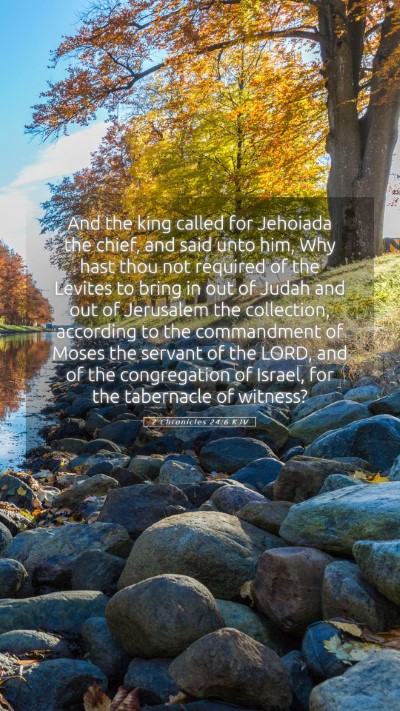Understanding 2 Chronicles 24:6
Bible Verse: 2 Chronicles 24:6
Text: "And the king called for Jehoiada the chief, and said unto him, Why hast thou not required of the Levites to bring in out of Judah and out of Jerusalem the collection, according to the commandment of Moses the servant of the Lord, and of the congregation of Israel, for the tabernacle of witness?"
Overview of the Verse
This verse reflects a critical moment in Judah’s history during the reign of King Joash. It highlights King Joash's concern for the proper maintenance and worship of the Temple of God, which had fallen into disrepair. His inquiry directed towards Jehoiada, the chief priest, signifies his intention to restore proper worship and fulfill the divine commandments associated with temple offerings.
Historical Context
The context of 2 Chronicles 24 is set during the reign of Joash, who became king at a young age after a tumultuous period marked by the slaughter of the previous royal heirs. Guided by Jehoiada, a priest, Joash fostered a revival of true worship in Judah. However, as years passed, neglect of the Temple became evident, prompting Joash’s call for accountability.
Commentary Insights
- Matthew Henry's Commentary:
Henry emphasizes the seriousness with which King Joash approached worshipping God. He insists that the Levites were to uphold their responsibilities in the Temple, underscoring that material support for the sanctuary must not be neglected. Joash's query signifies a proactive leader seeking to honor God through communal participation in worship.
- Albert Barnes' Notes:
Barnes points out that the “collection” referred to is not merely a fund but a command from God concerning the maintenance of the Temple. His commentary reflects on the importance of following divine directives, especially regarding worship, which if ignored, would lead to spiritual decline.
- Adam Clarke's Commentary:
Clarke explains that this verse illustrates Joash’s dedication and desire to align with God’s instructions as laid out in the Mosaic law. It also shows an attempt at spiritual reform, acknowledging that attention to the Temple needs to be prioritized, reflecting on the importance of prioritizing worship and godly pursuits in society.
Meaning of the Verse
This verse exemplifies the theme of spiritual responsibility and the significance of collective worship within the covenant community of Israel. It indicates that even an appointed king must adhere to divine commandments regarding worship and offerings, demonstrating God’s supreme authority over human governance.
Significance and Application
Spiritual Responsibility: This passage can be applied as a reminder to individuals and communities about the importance of collective participation in worship and the necessity of prioritizing God’s house. Just as Joash held the priests accountable, modern believers are encouraged to reflect on their obligations towards their communal worship spaces.
Involvement in Worship: Through this verse, contemporary readers are invited to ponder their involvement in church life and maintenance. The neglect noted here serves as a cautionary tale for today’s congregations to actively support their communities and prioritize their spiritual undertakings.
Bible Cross References
- Exodus 25:2: Discusses the importance of a contribution to the Lord's Tabernacle.
- 2 Kings 12:4-16: A parallel account that also details the Temple repairs initiated by Joash.
- Malachi 3:10: Encourages bringing tithes and offerings into the storehouse as part of honoring God.
Conclusion
Understanding 2 Chronicles 24:6 through these various biblical commentaries provides a comprehensive insight into the principles of worship, accountability, and communal support in spiritual matters. This verse serves as a profound reminder of the necessity of upholding God's commands and ensuring that worship is not just a personal endeavor but a communal one, reflective of God’s order and expectation for His people.


